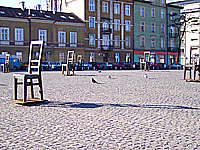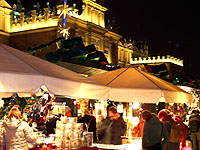Selected Archive News Stories of 2006 from Krakow
Info
Year 2006
Krakow Is Credit Worthy, BBB+
Standard and Poor’s has sustained its’ current BBB+
rating of Krakow’s municipality debt for 2006. In
their assessment the S&P have stressed the city hall
managed to stabilize its finances. They think the
cons are limited budget flexibility and restricted
ability to borrow more.
New Krakow Monument Commemorates Holocaust

After the 2005 overhaul Krakow’s Plac Bohaterow
Getta square on the Wisla right bank has been turned
into a monument to the holocaust victims. 70 bronze
chairs, 33 oversized and 37 sitable, commemorate
some 15,000 Krakow Jews who perished during the
German occupation. Between March 3, 1941 and March
13, 1943 the square was part of the Nazi-created
Jewish ghetto and place where its inhabitants were
being gathered for transports to
death camps.
Star SF Author Has Left Spaceship Earth
Stanislaw Lem,
Krakow’s science-fiction writer of a
worldwide renown, died on March 27. At 84, he
succumbed to heart disease after having been
hospitalized with circulatory problems for several
weeks. His best-known work is probably ‘Solaris’,
a novel published in 1961, that has been made into
films twice–first by Russia’s eminent auteur Andrei
Tarkovsky in 1971 and recently in 2002 by
Hollywood’s famed Steven Sodebergh with starring
George Clooney. Mr. Lem’s rich and diverse output
has been published in more than forty different
languages to date.
Over Half Million Cases. Speedy Justice,
Considering
Krakow’s courts of law completed 565,148 judicial
proceedings in 2005. Thus, on average, each of their
465 judges and assistant judges wrapped up four
cases per working day. Median duration of a lawsuit
in Krakow has been roughly three months for
mercantile litigation and even less before the
district criminal court.
Cracovia, the Ice Champ
Krakow’s ice hockey team, Cracovia, has won Poland’s
championship for 2006. Previously the club held the
title in 1949. This year Cracovia celebrates its
centenary as the club’s football team played its
first match in 1906.
A Pilgrim’s Vehicle of Choice: Pope-train
Special train service has linked the most popular
places of pilgrimage in the Krakow region, all of
them particularly related to John Paul II. The
purpose-built, state-of-the-art train shuttles three
times a day between Krakow and
Wadowice, the late Pope’s birthplace, via
Krakow’s Lagiewniki district and the town of
Kalwaria Zebrzydowska, famous for the
Sanctuary of Divine Mercy and for
Europe’s largest
Calvary sanctuary respectively.
Air-conditioned cars with facilities for the
disabled take 160 passengers who may enjoy
multimedia presentations in Polish, English, and
German about John Paul II and their travel
destinations. Tickets cost an equivalent of about 3
euro one way and roughly 4.5 euro return, and they
stay valid throughout the day so a single ticket
suffice for a day-trip to all of the above-mentioned
sites. The so-called ‘Papal Train’ (Paciag Papieski)
leaves from Krakow’s central station at 8:55 a.m.,
12:55, and 16:55, arrives to Wadowice at 10:08 a.m.,
14:08, and 18:08, and it’s back to Krakow Glowny
main station at 11:43 a.m., 15:43, and 19:43.
Same Boroughs, New-Old Names
Krakow’s current eighteen administrative districts,
dzielnica, have been given names in addition to the
Roman numbers that previously served as their
denotations. The city council toiled for a year over
its resolution that tries to adjust historical
designations to fairly new entities that rarely
match borders of traditional neighborhoods. Anyway,
Krakow officially divides now into the following
boroughs: Dzielnica I Stare Miasto (i.e. the Old
Town), Dzielnica II Grzegorzki, Dzielnica III
Pradnik Czerwony, Dzielnica IV Pradnik Bialy,
Dzielnica V Krowodrza, Dzielnica VI Bronowice,
Dzielnica VII Zwierzyniec, Dzielnica VIII Debniki,
Dzielnica IX Lagiewniki-Borek Falecki, Dzielnica X
Swoszowice, Dzielnica XI Podgorze Duchackie,
Dzielnica XII Biezanow-Prokocim, Dzielnica XIII
Podgorze, Dzielnica XIV Czyzyny, Dzielnica XV
Mistrzejowice, Dzielnica XVI Bienczyce, Dzielnica
XVII Wzgorza Krzeslawickie, Dzielnica XVIII Nowa
Huta.
Krakow Looks Forward To Pope’s Visit
Pope Benedict XVI is going to spend the
second half of his four-day pilgrimage to Poland,
May 25-28, in Krakow and its vicinity. The
highlights of his Krakow itinerary include a huge
open-air High Mass at the
Blonia common, an elite one in the
Wawel Cathedral, and meeting the young in
the
Lagiewniki Sanctuary of Divine Mercy. The
Holy Father will also see three sites in the Krakow
region, i.e. the former
Auschwitz death camp in Oswiecim,
John Paul II’s birthplace in Wadowice,
and the
Calvary sanctuary in Kalwaria Zebrzydowska.
As regards the first half of his Poland’s
pilgrimage, Benedict XVI plans to spend May 25 and
May 26 in
Warsaw and in the
Jasna
Gora sanctuary in Czestochowa.
Krakow Goes Dry May 27-28
Polish government banned selling any alcohol anywhere
in Krakow during Pope Benedict XVI’s visit to the
city on May 27 and May 28. The temporary prohibition
was extended also to some other powiats (counties)
in the Krakow region on the Holy Father’s itinerary:
chrzanowski, krakowski, myslenicki, oswiecimski
where the Auschwitz site is situated, and wadowicki
with Wadowice and nearby Kalwaria Zebrzydowska.
Concurrently a two-day ban on selling any beverages
with alcohol content above 4.5 percent was announced
for the entire
Malopolska province whose capital city is
Krakow.
John Paul II’s Trusted
Assistant Appointed a Cardinal
Krakow’s archbishop Stanislaw Dziwisz, 67, has been
appointed a cardinal. Before having taken over the
Krakow archdiocese last August, he had been
John Paul II’s private secretary for 27
years. As the late Pontiff’s closes associate for
over a quarter of century, don Stanislao, as the
prelate is widely known in Vatican, became the Holy
Sees’ eminence grise. Then Krakow’s archbishop Karol
Wojtyla, future pope John Paul II, made 27-year-old
Father Dziwisz his chaplain in 1966 and would take
him to Vatican in 1978 as his most trusted aide till
death last April.
Ten Million Euros for Renovation of Krakow’s
Monuments This Year
In 2006 public funds to the tune of 10 million euro,
nearly two million more than the previous year, have
been earmarked for renovation of Krakow’s
historical buildings. Largest grants,
roughly 790,000 euro each, were allotted for the
refurbishment of the 16th-century
Cloth Hall
and the
Wawel
Hill’s
improvements, namely fortifications repairs and the
restoration of one of the cathedral’s chapels. The
rest of this year’s renovation donations are
disbursed among 101 other landmarks in need of
renewal.
Crime Keeps Going Down in the Krakow Region
Police data for the
Malopolska Province – population 3.3
million of which some 800,000 living in
Krakow proper – shows criminality on
decrease in the first half of 2006. The total of
43,182 instances of lawbreaking, mostly petty crimes
such as minor burglaries or wallet-pinching, have
been reported over the six months till June 30
against 46,349 offenses in the corresponding period
of 2005 and 52,943 in the first half of 2004. Most
noticeable are the 50-percent decline in robberies
and the 25-percent one in car theft. The sharpest
fall in the number of reported transgressions,
misdemeanors and felonies occurred in Krakow itself.
The police connect the ebbing crime with the
emigration of the young unemployed, potential
troublemakers in that number, to the Western Europe
after Poland joined the European Union in 2004.
Krakow’s Bullish Economy
Recently published stats paint bright picture of
Krakow economy in the first half of the year with
the year on year productivity growth of 13.1 percent
throughout the entire
Malopolska province. Sales volume has
risen by 11.8 percent in industry and 14.1 percent
in construction while
retailers have sold 12.3 percent more in
money terms and wholesalers have managed to increase
their turnover by massive 36.3 percent. Employment
is up 1.9 percent and the average monthly pay has
risen by almost five percent to 2,539 zlotys but it
still slightly lags behind the country’s 2,624
zlotys.
Bus Your Bike
Krakow’s municipal
transport corporation, MPK, has equipped
17 of its buses with outside cycle racks, secured
with safety locks. They run on lines connecting the
downtown with parklands west of it as well as those
that link the city with some green outer suburbs.
The runs are denoted with letter R in the timetables
of the following bus lines – 109, 134, 155, 210,
248, 268 (weeklong), 147, 218, 255 (weekdays), and
209, 226, 230, 258 (weekends and holidays). The
service is available to bicycle owners solely on the
first and last stops as mounting bikes on the racks
requires assistance of the driver.
Estonia Joins Other Nations with Consular Service in
Krakow
The Estonian honorary
consulate
has opened in Krakow’s central
Old Town historic district at 15
Florianska street. It’s Estonia’s third such
outpost. Nine other nations have honorary consuls in
Krakow in addition to eight regular, fully-fledged
consular posts (see the list).
By Train to Krakow’s Airport
Long-awaited shuttle train has linked
Krakow’s John Paul II International Airport in
Balice with the Krakow Glowny main rail
station in the city center. It supplements bus
services and taxi cabs as the means of
transportation to and from the airport, now busiest
than ever. On average, trains run every thirty
minutes between 4 a.m. and midnight and the
15-kilometer journey lasts about 15 minutes. A
single ticket costs an equivalent of roughly one
euro. Tickets are being sold on the train.
Municipality Gives the Thumbs-up to Krakow’s Hostels
Krakow’s municipality has inspected the city’s
mushrooming
hostels, finding – surprise, surprise –
no significant faults. A special task force examined
the standard of accommodation, condition of
bathrooms and other facilities, cleanliness, and
whether price lists and other information published
online are accurate. Hostels and the like lodgings
account for about 11,000 of Krakow’s 26,000+ tourist
accommodation options, the rest being mostly hotel
rooms.
Police Help Line for Foreigners Is Back
Poland’s police headquarters has launched a summer
hotline for foreign tourists. Over a fixed line, one
may dial free number 0 800200300 to get
safety advice in English or German or
Russian. Over a cell phone the same is available at
number 608599999 and then the connection costs
whatever your telecom charge for a normal call. The
service is available through September 30 from 10
a.m. to 10 p.m.
35,000 Freshmen Are Heading for Krakow
This October the record number of almost 35,000 new
students are to begin their studies in
Krakow universities and the city’s other
institutions of higher education, while
some 45,000 other applicants have been rejected.
Curriculums most popular with the freshmen are law
and psychology at the
Jagiellonian University, sociology and
computer science at the AGH University of Science
and Technology, and finances with banking at the
Academy of Economics.
Developers, Keep Your Hands Off
Krakow’s City Council has created the 1,107-hectare
Zwierzyniec Culture Park (Zwierzyniecki Park
Kulturowy) just west of the downtown, a mile or so
from the central
Old Town historical district. It
comprises parklands, notably the Las Wolski forest,
as well as a good deal of Wola Justowska inner
suburb, the city’s most prized residential area. And
it boasts such landmarks as the 17th-century
Bielany monastery,
the Kosciszko Mound and the Pilsudski Mound.
The new entity is meant to protect the bucolic area
from excessive development.
Readers of a US Travel Magazine: Krakow Ahead of
Paris, Prague, and Barcelona
The Readers of the ‘Travel+Leisure’ magazine, a US
monthly with ties to the American Express company
and the estimated readership of 4.5 million, have
voted Krakow the world’s fifth most attractive city
this year. Florence, Rome, Venice, and Istanbul rank
higher than Krakow on the list of ‘The World’s Best
Cities’, while Paris, Prague, Siena, Seville, and
Barcelona occupy slots 5-10 respectively. Last year
Krakow was placed tenth on the same list.
Shopping Mall to Start With
Giant new
shopping
mall has opened next to
Krakow’s central Old Town historic district.
The strategically situated 123,000-sq-meter Galeria
Krakowska adjoins the city’s Krakow Glowny principal
rail station that itself abuts the main bus depot.
The immense shopping center boasts 270
shops and department stores, 14
eateries, and 9
coffeehouses. It forms the first part of
the New
City (Nowe Miasto) project to be
supplemented with hotels, office buildings, and
blocks of flats in three to four years.
The World’s Capital of Graphic Arts, for Now
Krakow’s 18th International Triennial of Graphic Arts
consists of 30-plus exhibitions in the city’s
various galleries and museums. The flagship show in
the Bunkier Sztuki gallery, 3a Plac Szczepanski
square at the Planty gardens, features 300 best
works of the total of 4,500 entries for this year’s
competition sent by nearly 2,000 artists from all
continents save the Antarctic. The Grand Prix award
has been bestowed on Belgium’s Ingrid Ledent. The
triennial lasts through mid-October.
Bookish
Over 20,000 visitors bought tickets for an equivalent
of 1.8 euro each to see the 10th Krakow Book Fair,
October 19-22. At the same time 412 publishers and
other exhibitors tried to woo them to their stands
and a couple of hundred authors turned up to sign
their books. The bestseller was this year’s Nobel
Prize Winner Orhan Pamuk’s ‘The Snow’,
published in Polish by Krakow’s Wydawnictwo
Literackie publishing house, that sold 450 copies or
so. Also, nearly 500 fringe events, such as
readings, took place all over the city.
Krakow’s Voters Have Chosen More of the Same
Krakow’s incumbent mayor Jacek Majchrowski, a
university professor by profession, has won his
second four-year term in the office in this year’s
local elections. In the runoff on November 26 Mr.
Majchrowski, a leftist running on an independent
ticket, has got 60 percent of the vote against an
opponent from Poland’s ruling right-wing PiS party,
Ryszard Terlecki, also a university professor. Two
weeks earlier in the local elections centrist PO
party has won a slim majority of 22 seats in the
43-member
city council, trailed by PiS with 19
seats.
New Coalition Government for the Malopolska Province
The local elections on November 12 has produced new
government of the
Malopolska Province (Wojwodztwo Malopolskie)
whose metropolis and capital city is Krakow. In its
aftermath the right-wing PiS party has dropped its
erstwhile coalition partners of the centrist PO
party and teamed up with smaller factions, the
far-right LPR and the PSL peasant party. In the
39-member provincial parliament (sejmik) PiS enjoys
plurality of 16 seats against 13 in the hands of PO,
while LPR and PSL have 4 each, with the remaining
two seats taken by leftists.
Enter Zoo Heavyweights
Krakow rejoices at the arrival of two Asian cow
elephants to the city zoo. 40-year-old Baby and her
friend Citta, 30, have been purchased from Spain’s
Terra Natura Park in Valencia for euro 30,000 plus
euro 17,000 transport costs.
Krakow zoo’s previous single elephant
died last July and ever since various local
politicos have vied to find the replacement.
The Festive Shopping Season

Krakow’s
Christmas market takes place on the Old
Town’s Rynek Glowny central square till December 26.
From 8 a.m. till 8 p.m. wooden stands sell an
assortment of the season’s decorations and sweets as
well as other wares, from jewelry to ceramics.
Special attractions include folk
dances, concerts of carols, various shows,
etc. And outdoor food joints offer hearty
meals
and mulled
wine.
Long Live Christmas!
52-foot-tall Christmas
tree has shot up on
Krakow’s central Rynek Glowny square
overnight, a sure sign that the festive season
engulfs in the city. Over 400 decorations bedeck the
grand spruce, illuminated by 8,000 lights. At the
same time it looks like more streets than ever,
including almost all in the Old Town historic
district, have got Yuletide finery this year. The
festive glitter will last in Krakow till early
February, courtesy of Poland’s long
Christmas season.
Christmas Charity Meal
100,000 dumplings, six tons of sauerkraut with
mushrooms, and 6,000 helpings of wild-mushroom
soup–traditional Polish dishes for Chrismas Eve’s
wigilia dinner–featured in the free meal for the
poor on Krakow’s central Rynek Glowny square on
December 17, the last Sunday before Christmas. The
well-publicized yearly open-air feast, courtesy of
two local food companies, has gathered thousands of
the city’s needy residents as well as the homeless
from other parts of Poland for the last nine years.
|




